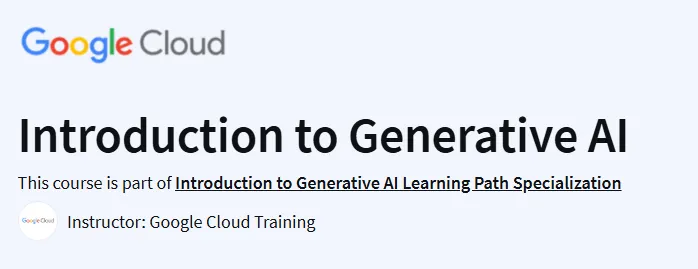What you will learn in Introduction to Generative AI Course
- Learn the fundamentals of generative AI and how it differs from traditional AI.
- Explore different generative AI models such as GANs, transformers, and diffusion models.
- Understand the role of large language models (LLMs) like ChatGPT and Bard.
- Discover how generative AI is used in text, image, video, and music creation.
- Gain insights into ethical concerns, biases, and responsible AI usage.
- Learn about real-world applications in industries like healthcare, marketing, and finance.
Program Overview
Introduction to Generative AI
⏱️ 2-3 weeks
- Learn what generative AI is and how it works.
- Explore different AI model architectures used for content generation.
- Understand the evolution of AI from rule-based systems to deep learning models.
Types of Generative AI Models
⏱️ 3-5 weeks
- Study major generative AI models, including GANs, transformers, and diffusion models.
- Learn how models like GPT, DALL·E, and Stable Diffusion generate text and images.
- Understand reinforcement learning and how it enhances AI capabilities.
Applications of Generative AI
⏱️4-6 weeks
- Explore how generative AI is used in marketing, healthcare, gaming, and other industries.
- Learn about AI-generated art, deepfake technology, and automated content creation.
- Examine AI’s impact on creative industries and business automation.
Ethical Considerations and AI Bias
⏱️5-7 weeks
- Understand the risks of AI-generated misinformation and bias.
- Learn responsible AI practices and guidelines for ethical AI development.
- Discuss privacy concerns and regulatory frameworks for AI governance.
Hands-on Project
⏱️ 6-8 weeks
- Apply generative AI tools to create text, images, or videos.
- Develop a small AI-powered application or analyze existing AI-generated content.
- Present findings and discuss AI’s impact on future innovations.
Get certificate
Job Outlook
- High Demand for AI Professionals: The AI industry is projected to grow exponentially, creating opportunities in machine learning, data science, and AI development.
- Competitive Salaries: AI engineers and machine learning specialists earn $100,000 – $150,000 per year, with top AI professionals making over $200,000.
- Industry Applications: Generative AI is widely used in marketing, content creation, healthcare, software development, and finance.
- Entry into AI Careers: This course provides a strong foundation for roles such as AI Researcher, Machine Learning Engineer, and AI Product Manager.
- Gateway to Advanced AI Learning: Builds a foundation for further studies in deep learning, AI ethics, and advanced machine learning techniques.
Explore More Learning Paths
Expand your understanding of generative AI and learn how to leverage its transformative potential with these curated programs designed to boost your AI skills and creative problem-solving abilities.
Related Courses
Generative AI for Everyone Course – Explore the fundamentals of generative AI and understand its applications across industries.
Generative AI Assistants Specialization Course – Learn how to design and implement AI-powered assistants for productivity and business solutions.
Generative AI: Introduction and Applications Course – Gain practical insights into generative AI tools, workflows, and real-world applications.
Related Reading
What Is Python Used For – Understand how Python underpins AI development and powers generative AI workflows.
Specification: Introduction to Generative AI Course
|
FAQs
- Start with basic concepts: understand what Generative AI is and how it differs from traditional AI techniques.
- Learn about model types: GANs, transformers, diffusion models, and LLMs like ChatGPT and Bard.
- Explore real-world applications: AI-powered text, image, video, and music generation across various industries.
- Include ethics and bias discussions to grasp responsible AI use.
- Apply knowledge through a hands-on project, such as building a simple text- or image-generating application.
- Yes—there are beginner-friendly, low-cost options typically lasting 2–3 weeks, often available on subscription platforms.
- Many are non-technical, focusing on foundational knowledge rather than code.
- Some may offer free previews or audit options, though the course.careers page indicates a one-time purchase (“Lifetime” access).
- Generative AI fundamentals: learn how these models work and architectural evolution from rule-based to deep learning.
- Model overview: cover GANs, transformers, diffusion models, and how LLMs like ChatGPT generate content.
- Applications across formats: see how Generative AI creates text, imagery, video, and music.
- Ethical awareness: address bias, misinformation, privacy, and AI governance.
- Practical execution: use tools to create generative outputs and analyze their impact.
- Yes—the growing demand for AI professionals, especially in creative and tech roles, makes such courses valuable.
- Roles like AI Researcher, ML Engineer, and AI Product Manager become more accessible with foundational knowledge.
- Competitive salaries—ranging from $100k to $150k, with top professionals earning over $200k—highlight the economic upside.
- It’s a stepping stone—ideal for those considering deeper studies in AI ethics, deep learning, or advanced modeling.
- Typical timeline: 2–3 weeks for core modules, followed by 6–8 weeks for the hands-on project.
- Course structure:
Intro to Generative AI: 2–3 weeks—understanding fundamentals.
Model types: 3–5 weeks—covering architectures like GANs, transformers, diffusion.
Applications: 4–6 weeks—industry use cases and content creation.
Ethics: 5–7 weeks—AI bias, privacy, regulation.
Capstone project: 6–8 weeks—hands-on generative AI tool implementation.





